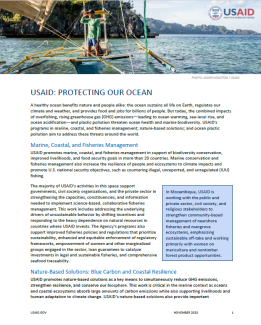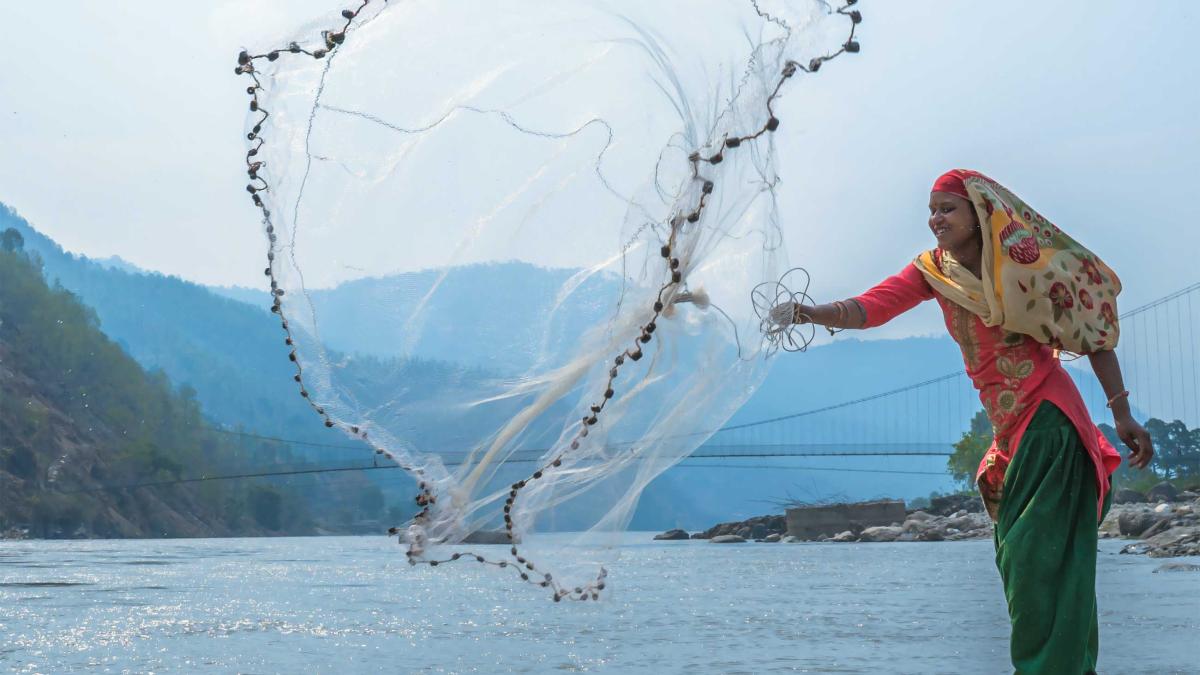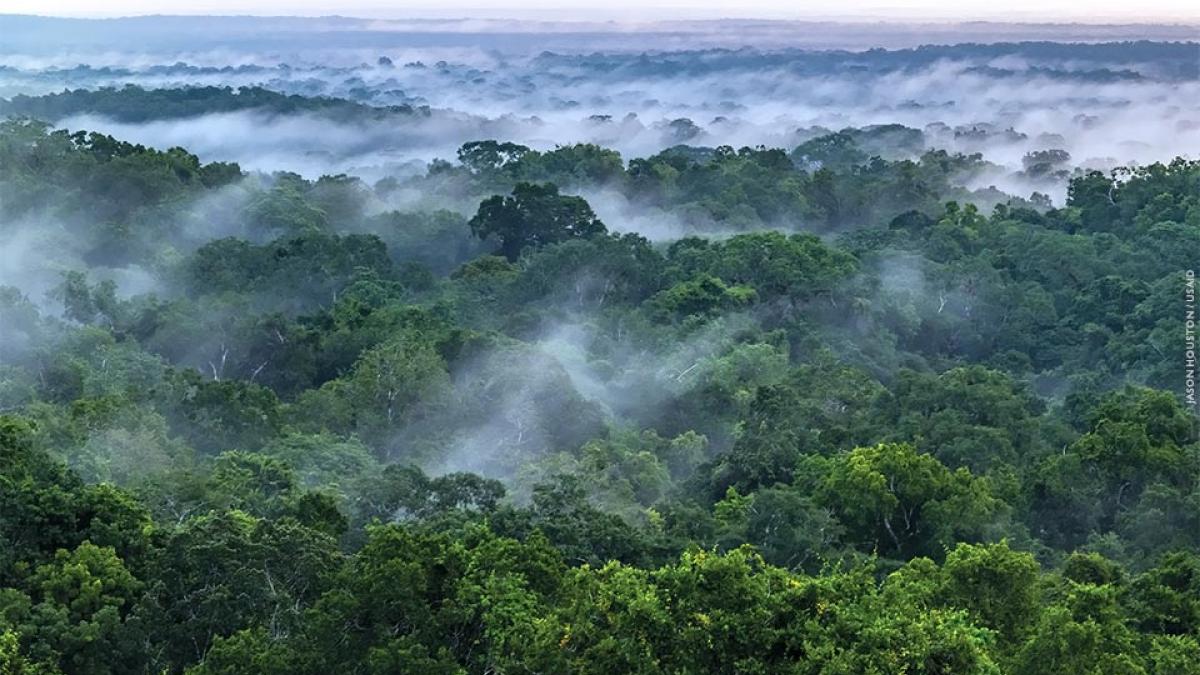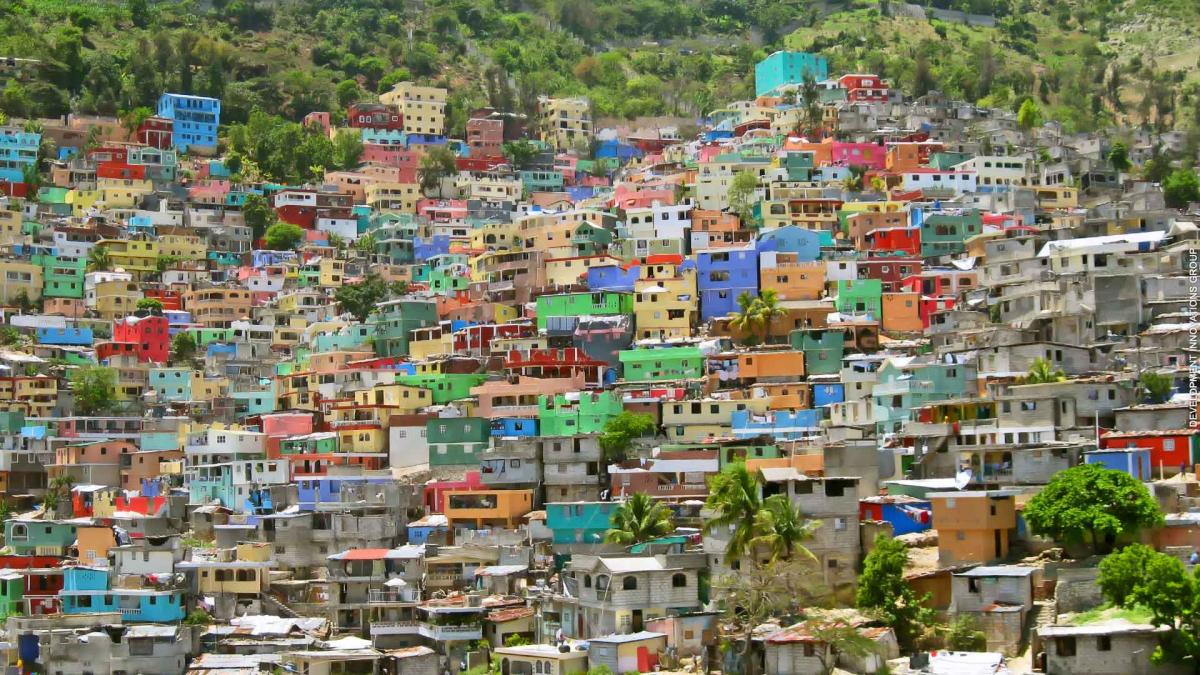Protecting Our Ocean
Biodiversity Conservation, Natural Climate Solutions, and Sustainable Urbanization
Fact Sheet –
A healthy ocean benefits nature and people alike: the ocean sustains all life on Earth, regulates our climate and weather, and provides food and jobs for billions of people. But today, the combined impacts of overfishing, rising greenhouse gas (GHG) emissions—leading to ocean warming, sea-level rise, and ocean acidification—and plastic pollution threaten ocean health and marine biodiversity. USAID's programs in marine, coastal, and fisheries management; nature-based solutions; and ocean plastic pollution aim to address these threats around the world.
Marine, Coastal, and Fisheries Management
USAID promotes marine, coastal, and fisheries management in support of biodiversity conservation, improved livelihoods, and food security goals in more than 20 countries. Marine conservation and fisheries management also increase the resilience of people and ecosystems to climate impacts and promote U.S. national security objectives, such as countering illegal, unreported, and unregulated (IUU) fishing.
The majority of USAID’s activities in this space support governments, civil society organizations, and the private sector in strengthening the capacities, constituencies, and information needed to implement science-based, collaborative fisheries management. This work includes addressing the underlying drivers of unsustainable behavior by shifting incentives and responding to the heavy dependence on natural resources in countries where USAID invests. The Agency’s programs also support improved fisheries policies and regulations that prioritize sustainability, enhanced and equitable enforcement of regulatory frameworks, empowerment of women and other marginalized groups engaged in the sector, loan guarantees to catalyze investments in legal and sustainable fisheries, and comprehensive seafood traceability.
In Mozambique, USAID is working with the public and private sector, civil society, and religious stakeholders to strengthen community-based management of nearshore fisheries and mangrove ecosystems, emphasizing sustainable off-take and working primarily with women on mariculture and nontimber forest product opportunities.
Nature-Based Solutions: Blue Carbon and Coastal Resilience
USAID promotes nature-based solutions as a key means to simultaneously reduce GHG emissions, strengthen resilience, and conserve our biosphere. This work is critical in the marine context as oceans and coastal ecosystems absorb large amounts of carbon emissions while also supporting livelihoods and human adaptation to climate change. USAID’s nature-based solutions also provide important humanitarian and development benefits, such as food security and livelihoods, and promote equity and inclusion.
For example, USAID is bringing together scientific and economic experts to strengthen understanding of blue carbon opportunities for small island developing states and archipelagic countries in the Indo-Pacific from both ecosystems and fisheries for the benefit of communities and the climate, as well as providing data and technical assistance for country-led efforts on mangrove conservation and restoration around the world. USAID also supports integrated coastal zone management and planning, coral reef restoration, and tools and capacity building for local governments, civil society, academia, and communities to use nature-based solutions for coastal flood risk management and disaster risk reduction.
Finally, USAID is helping local stakeholders connect with private sector finance for blue carbon and coastal resilience projects that generate biodiversity conservation, climate mitigation, and climate adaptation outcomes with equitable benefit distribution and safeguards for local communities.
USAID is supporting the assessment of mangrove change and vulnerability in India and the identification of key sites for mangrove rehabilitation in Indonesia, while also helping Asia Pacific countries incorporate mangroves into their nationally determined contributions.
Ocean Plastic Pollution
USAID is combating ocean plastic pollution by building the capacity of cities to manage waste sustainably, creating an enabling environment for a circular economy, promoting social and behavior change for reduced single-use plastics, and empowering informal waste workers, especially women. To date, USAID programs have prevented the equivalent of over 7.9 billion plastic bottles from polluting the environment and mobilized $118.4 million in public and private funding to strengthen local recycling and solid waste management systems.
Through the Save Our Seas Initiative, a global effort to end plastic pollution, USAID works holistically to create inclusive circular economies together with local and national governments, communities, and the private sector to prevent plastic from getting into the natural environment in the first place. The Save Our Seas Initiative includes 14 national and regional USAID programs in key countries and regions that represent 40 percent of total global mismanaged plastic waste.
In the Dominican Republic, USAID’s Save Our Seas Initiative is aiding the transition to sanitary landfills, where recyclables can be separated and cleaned and non-recyclable waste disposed of safely. So far, these changes have resulted in the safe management of more than 357,000 metric tons of waste, including 47,000 metric tons of plastic.





